人教版九年级英语第六单元基础知识整理
- 格式:docx
- 大小:28.97 KB
- 文档页数:12
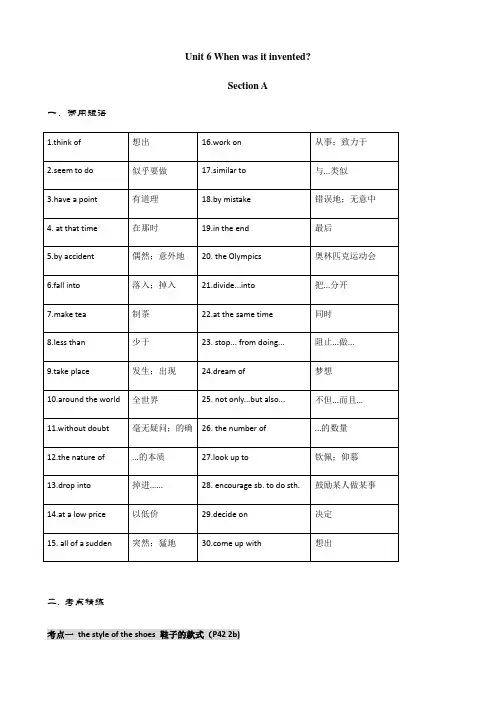
Unit 6 When was it invented?Section A一.常用短语二.考点精练考点一the style of the shoes 鞋子的款式(P42 2b)(1)style词性_________,意为__________。
常用短语in style意为“时髦的”,其反义短语为_____________,意为“过时的”。
名词/“样式;款式”/out of style☑ This year's style in dresses is different from last year's.今年的裙子样式与去年的不同。
☑ Her clothes are always in style.她的衣服总是很时髦。
(2)style 做名词,还可意为___________。
“方式”☑ Our children need new learning styles.我们的孩子需要新的学习方式。
考点二With pleasure! 非常愿意!(P42 2d)pleasure词性_________,意为___________。
名词/“高兴;愉快”☑ Watching the 2016 Summer Olympics gave him great pleasure.观看2016年夏季奥运会给他以极大的愉悦。
【辨析】with pleasure与my pleasure☑-Could you help me with my English?你能帮我学习英语吗?-With pleasure.当然可以。
☑ Thanks for helping me.谢谢你帮助了我。
-My pleasure./It's a pleasure.别客气。
考点三Think about how often it's used in our daily lives. 想想看,在我们的日常生活中它被使用得多么频繁。
(P42 2d)daily此处词性为_________,意为___________。
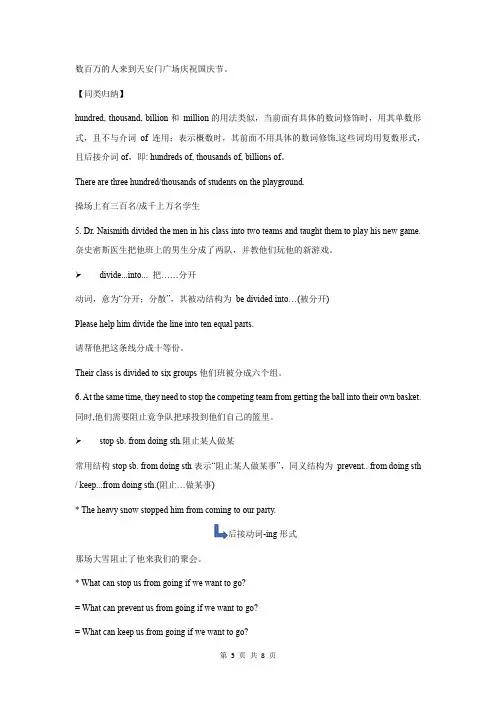
人教版九年级英语第六单元Unit6 section B知识点精讲Section B单词1.salty /'sɔːlti/ adj.咸的助记salt(n.盐)+y(形容词后缀)=salty典例The water should taste salt.这种水尝起来应该是咸的。
The dish is too salty.这道菜太咸了。
短语salty water盐水2.sour /'saʊə (r)/ adj.酸的;有酸味的助记蛇(s)把我们的(our)酸柠檬偷走了。
典例a sour lemon酸柠檬a bit sour有点儿酸sweet甜的sour酸的salty咸的hot辣的bitter 苦的3. customer /'kʌstəmə (r)/ n.顾客;客户助记custom(n.习惯)+er(名词后缀)= customer典例An ad sometimes leads customers to buy some useless things.广告有时候会引导顾客买一些无用的东西。
联想customs n.关税海关customer n.消费者——custom n.习惯风俗——accustomed adj.通常的,习惯的accustom v.使习惯于4. Canadian /kə'neɪdiən/ adj.加拿大的;加拿大人的n.加拿大人助记Canada(n.加拿大)去a+ ian(名词后缀)典例my Canadian friends(形容词)我的加拿大朋友He is a Canadian.(名词)他是一个加拿大人。
联想Canada n.加拿大5. divide/dɪ'vaɪd/ v.分开;分散助记弟弟(di)分开了这六(vi)个德(de)国人。
典例Divide it in half.把它分成两半Divide the cake with your little brother.和你的小弟弟分这块蛋糕短语divide…into…把…分开辨析divide与separatedivide指把整体划分为若干部分separate常与from连用,表示“把……从……分离”,指把原来连在一起或靠近的各个部分隔开6.hero /'hɪərəʊ / n.英雄;男主角助记她(her)眼(o)里只有英雄。
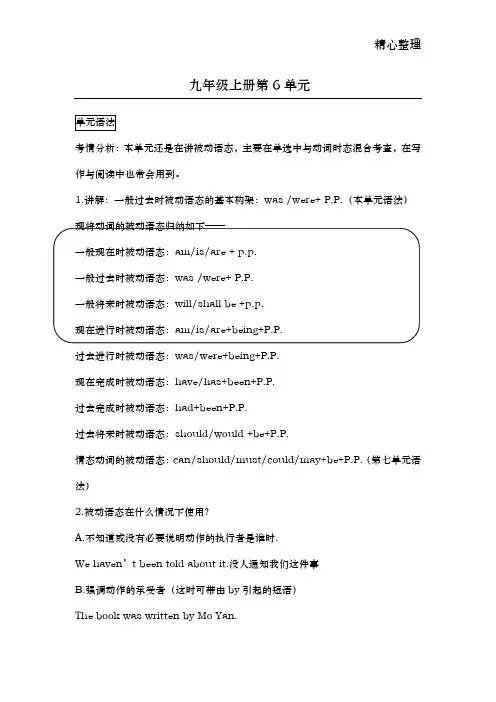
精心整理九年级上册第6单元考情分析:本单元还是在讲被动语态,主要在单选中与动词时态混合考查,在写作与阅读中也常会用到。
A.不知道或没有必要说明动作的执行者是谁时.We haven’t been told about it.没人通知我们这件事B.强调动作的承受者(这时可带由by引起的短语)The book was written by Mo Yan.C.不愿说出动作的执行者是谁He was asked to give a speech about how to study English well.3.被动语态的注意事项:A. there be 结构没有被动语态B.主句中宾语是反身代词的没有被动语态7.fall into落入,陷入。
比较容易搞混淆的还有:fall down摔倒,fall off掉下,fall asleep入睡8.辨析:remain是动词,保持不变/仍然是;remind动词,提醒,remind to do sth,remind···of。
9.辨析:【了解】家;translation名词,翻译15.all of a sudden突然,猛地=suddenly16.by mistake无意中,错误地17.much-loved 深受喜爱的,复合形容词18.divide···into···把····分成·····19.stop···from···阻止····做····20.dream of/about 梦想···向往···· (of/about是介词,后面的动词用-ing 形式)21.look up to 倾佩/仰慕/抬起头看练习:(15年上海中考)以“I want to invent ______"为题,写一篇不少于60个词的短文,标点符号不占格参考词汇:1.It can be used to ...with the help of our robot doctors,?you can talk to your personal doctor one to one whenever you want.In short, family doctor robots can?make great contribution to?our society.精彩亮点分析:亮点一:全文巧用“first, furthermore, in short”等连接词,把家庭机器人医生的好处写的非常清晰,让阅卷老师一目了然。
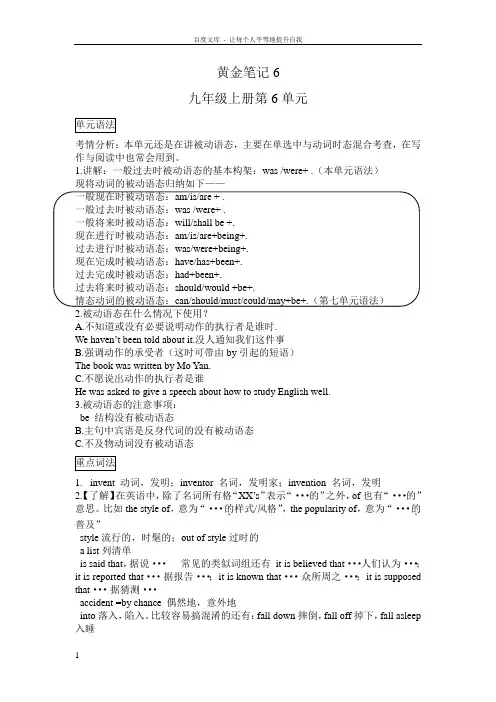
黄金笔记6九年级上册第6单元单元语法考情分析:本单元还是在讲被动语态,主要在单选中与动词时态混合考查,在写作与阅读中也常会用到。
1.讲解:一般过去时被动语态的基本构架:was /were+ .(本单元语法)现将动词的被动语态归纳如下——一般现在时被动语态:am/is/are + .一般过去时被动语态:was /were+ .一般将来时被动语态:will/shall be +.现在进行时被动语态:am/is/are+being+.过去进行时被动语态:was/were+being+.现在完成时被动语态:have/has+been+.过去完成时被动语态:had+been+.过去将来时被动语态:should/would +be+.情态动词的被动语态:can/should/must/could/may+be+.(第七单元语法)2.被动语态在什么情况下使用?A.不知道或没有必要说明动作的执行者是谁时.We haven’t been told about it.没人通知我们这件事B.强调动作的承受者(这时可带由by引起的短语)The book was written by Mo Yan.C.不愿说出动作的执行者是谁He was asked to give a speech about how to study English well.3.被动语态的注意事项:be 结构没有被动语态B.主句中宾语是反身代词的没有被动语态C.不及物动词没有被动语态重点词法1.invent 动词,发明;inventor 名词,发明家;invention 名词,发明2.【了解】在英语中,除了名词所有格“XX’s”表示“···的”之外,of也有“···的”意思。
比如the style of,意为“···的.样式/风格”,the popularity of,意为“···的.普及”style流行的,时髦的;out of style过时的a list列清单is said that,据说···常见的类似词组还有it is believed that···人们认为···;it is reported that···据报告···;it is known that···众所周之···;it is supposed that···据猜测···accident =by chance 偶然地,意外地into落入,陷入。
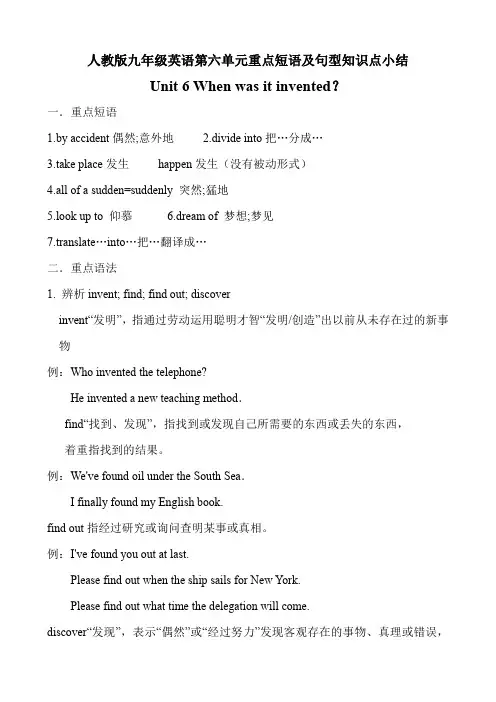
人教版九年级英语第六单元重点短语及句型知识点小结Unit 6 When was it invented?一.重点短语1.by accident偶然;意外地2.divide into把…分成…3.take place发生happen发生(没有被动形式)4.all of a sudden=suddenly 突然;猛地5.look up to 仰慕6.dream of 梦想;梦见7.translate…into…把…翻译成…二.重点语法1. 辨析invent; find; find out; discoverinvent“发明”,指通过劳动运用聪明才智“发明/创造”出以前从未存在过的新事物例:Who invented the telephone?He invented a new teaching method.find“找到、发现”,指找到或发现自己所需要的东西或丢失的东西,着重指找到的结果。
例:We've found oil under the South Sea.I finally found my English book.find out指经过研究或询问查明某事或真相。
例:I've found you out at last.Please find out when the ship sails for New York.Please find out what time the delegation will come.discover“发现”,表示“偶然”或“经过努力”发现客观存在的事物、真理或错误,即指发现原来客观存在但不为人所知的事物,也可表示发现已为人所知的事物的新的性质或用途。
Columbus discovered America in1492.We soon discovered the truth.我们很快就弄清了真相。
【练习】a.Edison ____the electric lamp.b.I lost my necklace last night.I haven’t ____it.c.Who ____America first?d.Can you ____what time the train leaves?2.一般过去时的被动语态(见P188页)结构:was/were+过去分词【练习】( ) 1. People's Republic of China __ on October 1, 1949.A. foundB. was foundedC. is foundedD. was found( ) 2. English ____ in Canada.A. speaksB. are spokenC. is speakingD. is spoken( ) 3 This English song __ by the girls after class.A. often singsB. often sangC.is often sangD.is often sung( ) 4 This kind of car___ in Japan.A. makesB. madeC. is makingD. is made( ) 5 Computers ___ all over the world.A. is usedB. are usingC. are usedD. have used。
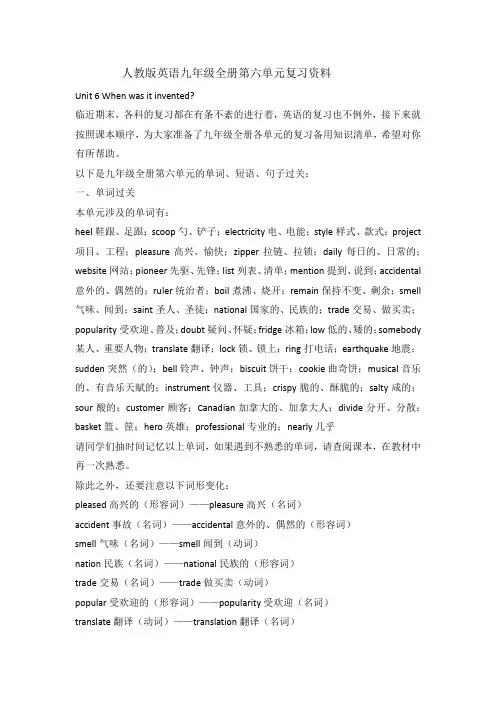
人教版英语九年级全册第六单元复习资料Unit 6 When was it invented?临近期末,各科的复习都在有条不紊的进行着,英语的复习也不例外,接下来就按照课本顺序,为大家准备了九年级全册各单元的复习备用知识清单,希望对你有所帮助。
以下是九年级全册第六单元的单词、短语、句子过关:一、单词过关本单元涉及的单词有:heel鞋跟、足跟;scoop勺、铲子;electricity电、电能;style样式、款式;project 项目、工程;pleasure高兴、愉快;zipper拉链、拉锁;daily每日的、日常的;website网站;pioneer先驱、先锋;list列表、清单;mention提到、说到;accidental 意外的、偶然的;ruler统治者;boil煮沸、烧开;remain保持不变、剩余;smell 气味、闻到;saint圣人、圣徒;national国家的、民族的;trade交易、做买卖;popularity受欢迎、普及;doubt疑问、怀疑;fridge冰箱;low低的、矮的;somebody 某人、重要人物;translate翻译;lock锁、锁上;ring打电话;earthquake地震;sudden突然(的);bell铃声、钟声;biscuit饼干;cookie曲奇饼;musical音乐的、有音乐天赋的;instrument仪器、工具;crispy脆的、酥脆的;salty咸的;sour酸的;customer顾客;Canadian加拿大的、加拿大人;divide分开、分散;basket篮、筐;hero英雄;professional专业的;nearly几乎请同学们抽时间记忆以上单词,如果遇到不熟悉的单词,请查阅课本,在教材中再一次熟悉。
除此之外,还要注意以下词形变化:pleased高兴的(形容词)——pleasure高兴(名词)accident事故(名词)——accidental意外的、偶然的(形容词)smell气味(名词)——smell闻到(动词)nation民族(名词)——national民族的(形容词)trade交易(名词)——trade做买卖(动词)popular受欢迎的(形容词)——popularity受欢迎(名词)translate翻译(动词)——translation翻译(名词)sudden突然的(形容词)——suddenly突然地(副词)music音乐(名词)——musical音乐的(形容词)二、短语过关本单元在单词表中出现的短语:1、have a point 有道理2、by accident 偶然、意外地3、take place 发生、出现4、without doubt 毫无疑问5、all of a sudden 突然、猛地6、by mistake 错误地、无意中7、the Olympics 奥林匹克运动会8、divide … into … 把……分开9、not only … but also … 不仅……而且……10、look up to … 钦佩、仰慕课文中出现的重点短语:1、shoes with special heels 带有特别后跟的鞋子2、be used for doing sth. 被用来做某事3、With pleasure! 很荣幸4、daily lives 日常生活5、at that time 在那个时候6、be widely used 被广泛使用7、the first one to do sth. 第一个做某事的人8、a few thousand years later 几千年以后9、less than 少于10、even though 即使11、at a low price 以一个超低的价格12、advise sb. not to do sth. 建议某人不作某事13、go out alone 独自外出14、in the end 最后15、potato chips 薯片16、more than 超过17、in history 在历史上11、at the Olympics 在奥运会上18、be born 出生19、teach sb. to do sth. 教某人做某事20、work together 一起努力21、stop sb. from doing sth. 阻止某人做某事22、around the world 全世界23、encourage sb. to do sth. 鼓励某人做某事24、achieve one’s dream 实现某人的梦想三、句子过关1、Shoes with special heels are used for changing the sty le of the shoes.具有特别后跟的鞋子用来调整鞋的样式。
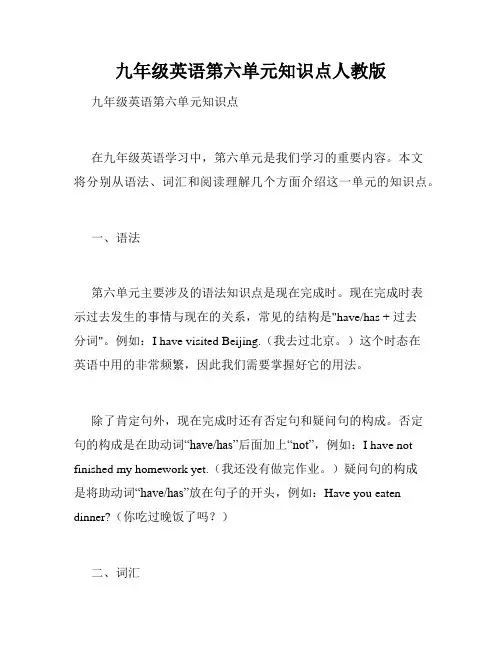
九年级英语第六单元知识点人教版九年级英语第六单元知识点在九年级英语学习中,第六单元是我们学习的重要内容。
本文将分别从语法、词汇和阅读理解几个方面介绍这一单元的知识点。
一、语法第六单元主要涉及的语法知识点是现在完成时。
现在完成时表示过去发生的事情与现在的关系,常见的结构是"have/has + 过去分词"。
例如:I have visited Beijing.(我去过北京。
)这个时态在英语中用的非常频繁,因此我们需要掌握好它的用法。
除了肯定句外,现在完成时还有否定句和疑问句的构成。
否定句的构成是在助动词“have/has”后面加上“not”,例如:I have not finished my homework yet.(我还没有做完作业。
)疑问句的构成是将助动词“have/has”放在句子的开头,例如:Have you eaten dinner?(你吃过晚饭了吗?)二、词汇第六单元的词汇主要包括动词短语和名词短语。
例如,动词短语“look forward to”意思是“期待”,在句子中常用于表示期待将要发生的事情,例如:I am looking forward to the summer vacation.(我期待着暑假。
)名词短语“field trip”意思是“实地考察”,也可用作动词短语,表示“实地考察”。
词汇的积累是学习英语的基础,我们可以通过阅读、听力、写作等多种方式来扩大词汇量。
记忆词汇时,可以运用词语联想、造句等方法,提高记忆效果。
同时,多做一些词汇练习题也能够帮助我们记忆和掌握这些单元的词汇。
三、阅读理解在阅读理解方面,第六单元的重点是阅读理解技巧的提升。
我们需要学会如何从文章中获取信息、理解作者的意图以及推断词义。
对于这些技巧的提升,我们可以通过多读英文文章来培养,增加阅读量,从而提高阅读能力。
此外,我们还可以运用一些阅读理解策略来帮助我们更好地理解文章。
比如,可以先快速浏览文章的标题和每个段落的开头句子,从而获取文章的大意;可以使用问题预测法,先读问题,再带着问题去读文章,找到问题的答案等。
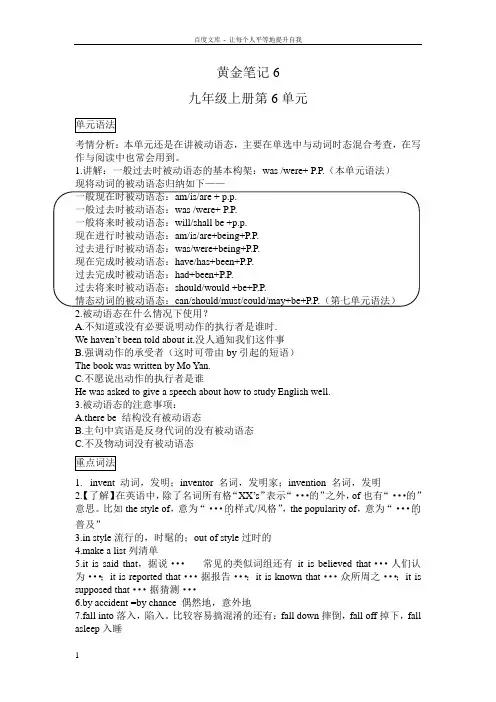
黄金笔记6九年级上册第6单元考情分析:本单元还是在讲被动语态,主要在单选中与动词时态混合考查,在写作与阅读中也常会用到。
1.讲解:一般过去时被动语态的基本构架:was /were+ P.P.(本单元语法)现将动词的被动语态归纳如下——2.被动语态在什么情况下使用?A.不知道或没有必要说明动作的执行者是谁时.We haven’t been told about it.没人通知我们这件事B.强调动作的承受者(这时可带由by引起的短语)The book was written by Mo Yan.C.不愿说出动作的执行者是谁He was asked to give a speech about how to study English well.3.被动语态的注意事项:A.there be 结构没有被动语态B.主句中宾语是反身代词的没有被动语态C.不及物动词没有被动语态1.invent 动词,发明;inventor 名词,发明家;invention 名词,发明2.【了解】在英语中,除了名词所有格“XX’s”表示“···的”之外,of也有“···的”意思。
比如the style of,意为“···的.样式/风格”,the popularity of,意为“···的.普及”3.in style流行的,时髦的;out of style过时的4.make a list列清单5.it is said that,据说···常见的类似词组还有it is believed that···人们认为···;it is reported that···据报告···;it is known that···众所周之···;it is supposed that···据猜测···6.by accident =by chance 偶然地,意外地7.fall into落入,陷入。
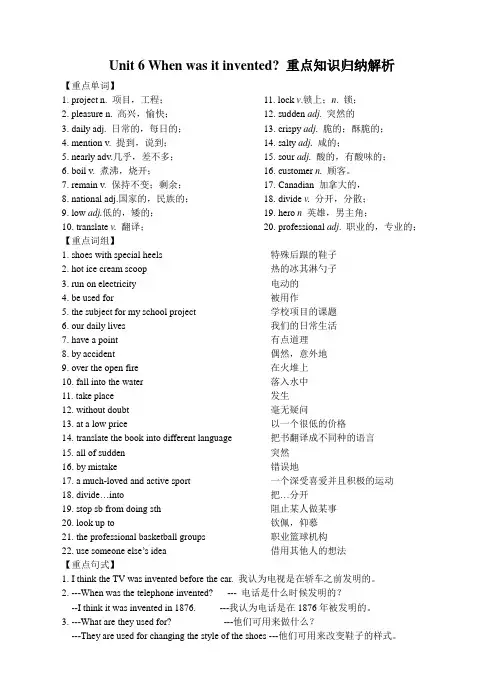
Unit 6 When was it invented? 重点知识归纳解析【重点单词】1. project n. 项目,工程;2. pleasure n. 高兴,愉快;3. daily adj. 日常的,每日的;4. mention v. 提到,说到;5. nearly adv.几乎,差不多;6. boil v. 煮沸,烧开;7. remain v. 保持不变;剩余;8. national adj.国家的,民族的;9. low adj.低的,矮的;10. translate v.翻译;11. lock v.锁上;n. 锁;12. sudden adj. 突然的13. crispy adj. 脆的;酥脆的;14. salty adj.咸的;15. sour adj.酸的,有酸味的;16. customer n.顾客。
17. Canadian 加拿大的,18. divide v.分开,分散;19. hero n英雄,男主角;20. professional adj. 职业的,专业的;【重点词组】1. shoes with special heels 特殊后跟的鞋子2. hot ice cream scoop 热的冰其淋勺子3. run on electricity 电动的4. be used for 被用作5. the subject for my school project 学校项目的课题6. our daily lives 我们的日常生活7. have a point 有点道理8. by accident 偶然,意外地9. over the open fire 在火堆上10. fall into the water 落入水中11. take place 发生12. without doubt 毫无疑问13. at a low price 以一个很低的价格14. translate the book into different language 把书翻译成不同种的语言15. all of sudden 突然16. by mistake 错误地17. a much-loved and active sport 一个深受喜爱并且积极的运动18. divide…into 把…分开19. stop sb from doing sth 阻止某人做某事20. look up to 钦佩,仰慕21. the professional basketball groups 职业篮球机构22. use someone else’s idea 借用其他人的想法【重点句式】1. I think the TV was invented before the car. 我认为电视是在轿车之前发明的。

人教版九年级英语第六单元知识点总结令人愉快的(1)With pleasure.我的荣幸(对方提出要求,答应对方的用语。
未提供帮助前。
)(It is )a pleasure/(It is )my pleasure.我的荣幸(是对方致谢时的答语。
提供帮助后。
)--Can you help me carry the box.--With pleasure./I would love to./No problem.--Thank you--(It is )a pleasure/(It is )my pleasure.(2)be pleased to do sth 愉快做某事 be pleased with sth 对….满意It’s my _____________(please) to help you.他对这辆车很满意。
_____________________________.(3)What pleased you best?3.Don’t mention it.(1)--I am sorry.-- Don’t mention it.(2)—Thank you--Don’t mention it.4.by accident/by chanceby mistakeon purpose/by design5.nearly/almost几乎,接近。
常可替换。
(1)但有very pretty not修饰时或者具体数字前常用nearly.习语 Not nearly远非,完全不 very(pretty) nearly几乎(2)almost可用于none no never nobody nothing等否定词之前,但nearly不可。
6.take place(计划,必然) /happen (偶然)均无被动。
happen/ take placehappen v “发生”没有被动语态,强调某事发生的偶然性a. sth. happen to sb. 某事发生在某人身上What happened to you?=What was wrong with him?b. sb. happen to do sth. 某人碰巧做某事C. It happened that…碰巧(2)take place 发生,没有被动语态,指事情有计划有安排地发生take the place of 取代……位置The sports meeting took place in our school last week.The story _______in a faraway small village. What ______ to the farmer?7.without doubt=There is no doubt8.all of a sudden=suddenly9.above/below(不垂直) over/under(垂直)10.translate..into..11.call sb=telephone sb=phone sb=give sb a call=ring sb up12.not only…but (also) 就近原则13.invent v 发明→inventor n 发明家→ invention n 发明Edison , a great ________, _________over 1’000__________ all his life.(invent) discover v 发现(指发现客观存在的事物invent v 发明(指创造“发明”出来新的东西)Columbus discovered America in1492. We soon discovered the truth.14. use (1) use v 用,使用→ useful adj. 有用的 (2) use up(有被动) = run out (不及物,无被动,接名词需加of)用完,用尽 We used up the water./The water was used up by us. We run out of the water./The water run out.(3) use sth to do sth 使用某物做某事 be used for doing=be used to do sth 被用来做某事 (4)used to do sth 过去常常做某事 (5)be used to doing sth 习惯于做某事(6)be used by +动作执行者被…..使用 (7)be used as+名词被用作….(8)be useful to 对……有用Tables were used___desks when we were young. A. by B. as C. to15. such a/an + 形容词 + 可数名词单数 = so + 形容词 + a/an + 可数名词单数such + 形容词 + 可数名词复数; such + 形容词 + 不可数名词so many/few + 可数名词复数; so much/little + 不可数名词都可和“that”连用,意思基本一样So that +句子以便,以致于用such或so填空。
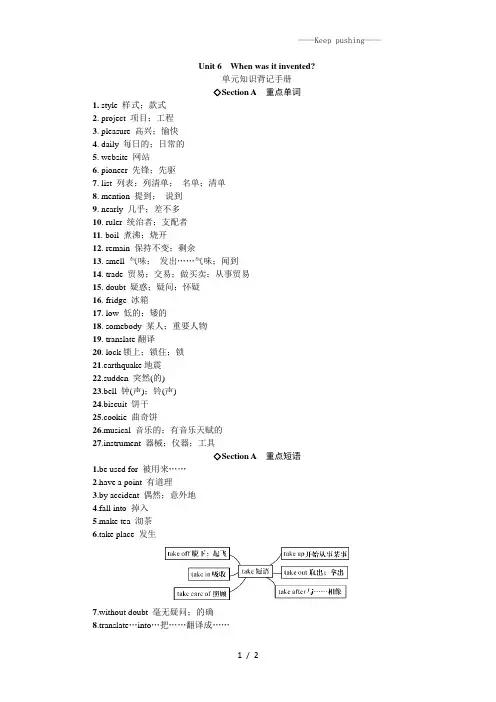
Unit 6When was it invented?单元知识背记手册◇Section A重点单词1. style 样式;款式2. project 项目;工程3. pleasure 高兴;愉快4. daily 每日的;日常的5. website 网站6. pioneer 先锋;先驱7. list 列表;列清单;名单;清单8. mention 提到;说到9. nearly 几乎;差不多10. ruler 统治者;支配者11. boil 煮沸;烧开12. remain 保持不变;剩余13. smell 气味;发出……气味;闻到14. trade 贸易;交易;做买卖;从事贸易15. doubt 疑惑;疑问;怀疑16. fridge 冰箱17. low 低的;矮的18. somebody 某人;重要人物19. translate翻译20. lock锁上;锁住;锁21.earthquake地震22.sudden 突然(的)23.bell 钟(声);铃(声)24.biscuit 饼干25.cookie 曲奇饼26.musical 音乐的;有音乐天赋的27.instrument 器械;仪器;工具◇Section A重点短语1.be used for 被用来……2.have a point 有道理3.by accident 偶然;意外地4.fall into 掉入5.make tea 沏茶6.take place 发生7.without doubt 毫无疑问;的确8.translate…into…把……翻译成……9.all of a sudden 突然;猛地◇Section B重点单词1.sour 酸的;有酸味的2.customer 顾客;客户3.Canadian 加拿大的;加拿大人的;加拿大人4.divide分开;分散5.basket篮;筐6.hero英雄;男主角◇Section B重点短语1.by mistake 错误地;无意中2.divide…into把……分开3.not only…but also…不但……而且……4.the number of………的数量5.look up to 钦佩;仰慕6.dream of梦想7.decide on决定e up with想出(意见、想法等)9.lead to导致◇词形变换1.pleasure→(动词)please→(形容词)pleased2.boil→(形容词)boiled3.sudden→(副词)suddenly4.musical→(名词)music5.Canadian→(名词)Canada6.popularity→(形容词)popular7.hero→(复数)heroes8.professional→(名词)profession◇重点句型1.But at that time,it wasn't used widely.但是在那时,它没被广泛应用。
人教版九年级英语unit6知识点总结人教版九年级英语Unit 6知识点总结Unit 6是人教版九年级英语中的一单元,主要涵盖了日常生活中与健康和环境保护相关的话题。
本单元的重点词汇包括environment, pollution, waste, 等等。
同时,还讲解了一些重要的语法知识,如被动语态和情态动词的用法。
以下是对Unit 6知识点的总结。
一、重点词汇1. environment:指的是周围的自然条件和周边事物的总称,比如大自然,环境等。
2. pollution:表示污染,是现代社会的一个严重问题,可以分为大气污染、水污染、噪音污染等。
3. waste:可以用作名词或动词,作为名词时表示废物或浪费,作为动词时表示浪费。
4. recycle:意为“回收利用”,指将废弃物转化成可再使用的物品。
5. protect:表示保护,指采取措施,预防破坏或危害。
6. global:意为“全球的”,用来描述事情或现象具有全球性的范围和影响。
7. vehicle:表示车辆,可用来指代各种交通工具,如汽车、火车等。
二、重要句型和语法知识1. 被动语态(Passive Voice)被动语态是英语中重要的语法结构之一,使用形式为“助动词be + 及物动词的过去分词”。
例如:- The book was written by him.(这本书是他写的。
)被动语态常用于以下情况:- 强调动作的接受者(宾语)而不是执行动作的人(主语)。
- 主语未知或不重要。
- 特定情境下。
2. 情态动词(Modal Verbs)情态动词用来表示情态、可能性、建议、允许等。
常见的情态动词有can, could, may, might, should, must, ought to等。
例如:- You should recycle the plastic bottles.(你应该回收塑料瓶。
)3. 祈使句(Imperatives)祈使句是用来发出命令、请求、建议等的句子。
Unit 6 When was it invented?Grammar Focus一般过去时的被动语态1.一般过去时的被动语态的句式结构2.一般过去时的被动语态的基本用法(1)表示过去某一具体时间发生的动作,且句子的主语是谓语动词动作的承受者。
☑ The house was built in 1990.这所房子建于1990年。
(2)讲述发生在过去的动作,且不知道动作的执行者。
☑ He was honored with the name “Father of Hybrid Rice”。
他被授予“杂交水稻之父”的称号。
3.含双宾语和复合宾语的主动句变为被动语态的方法(1)含有双宾语的主动句变为被动语态时,通常把指“人”的间接宾语变为主语,而指“物”的直接宾语则不变。
☑ He gave me a book yesterday.→I was given a book (by him) yesterday.(2)如果要把指“物”的直接宾语变为主语,则在间接宾语前加to或for.☑ I brought him some food.→Some food was brought to him (by me).(3)含有复合宾语的主动句变为被动语态时,要将其中的宾语变成主语,宾语补足语不变。
☑ Jim asked Tom to go for a walk.→Tom was asked (by Jim) to go for a walk.(4)如果宾语补足语是不带to的动词不定式,主动语态变成被动语态时要加上不定式符号to.☑ We often heard Kate sing in the room.→Kate was often heard to sing in the room (by us).【助记】一般过去时的被动语态被动一般过去时,基本结构“be pp”;be动词有was、were,人称和数主语定;疑问就把be提前,否定not在be后连。
人教版九年级英语第六单元Unit 6 section A+B知识点精讲Section A单词1. style /staɪl/ n.样式;款式典例I like this style. 我喜欢这个样式。
短语in style流行的;时髦的out of style过时的2. project /'prɒdʒekt/ n.项目;工程助记人生无须大project(工程),快乐才是subject(主题),体验才是object(目标)典例an international science project国际科学项目Project Hope希望工程联想subject.主题object.目标3.pleasure /'pleʒə (r)/ n.高兴;愉快助记please(v.使愉快)去e+-ure(名词后缀)= pleasure典例to read for pleasure读书以自娱短语with pleasure当然了/很愿意for pleasure为了消遣;为了娱乐联想pleased adj.高兴的;满意的pleasing adj.令人高兴的;令人满意的谚语Pain past is pleasure.苦尽甘来。
4. daily /'deɪli/ adj.每日的;日常的助记day(n.一天)变y为i+ly(形容词后缀)= daily典例There was little change in their daily lives. 他们的日常生活几乎没有变化。
近义everyday adj.每天的拓展daily还可作名词,意为“日报”。
注意-ly一般用作副词后缀,但是有些以-ly结尾的词是形容词。
常见的词如下:lovely可爱的weekly每周的monthly每月的yearly每年的friendly友好的lonely孤独的5. website /'websaɪt/ n.网站助记web(n.网)+site(n.地点;场所)= website典例There are many websites on the Internet now.现在因特网上有许多网站。
精品基础教育教学资料,仅供参考,需要可下载使用!Unit 6 When was it invented?第1课时Section A(1a2d)style n. 样式;款式pleasure n. 高兴;愉快。
常用短语:with pleasure 乐意效劳daily adj. 每日的;日常的。
与everyday同义。
daily还可作副词,意为“每日;每天”,相当于every daymention v. 提到;说到。
口语中说“Don't mention it.”主要用来回答感谢,有时也用来回答道歉【拓展】(1)It's a pleasure./My pleasure.意为“不客气/不用谢。
”如:—Thank you very much.非常感谢你。
—It's a pleasure.不用谢。
(2)与daily类似的词还有:weekly adj. 每周的;adv. 一周一次地。
monthly adj. 每月的;adv. 一月一次地。
yearly adj. 每年的;adv. 一年一次地。
be used for被用于……。
介词for表示用途,后接名词、代词或动词ing形式have a point 有道理(1)be used by 被……使用。
介词by后面接动作的执行者。
如:English is used by travelers all over the world. 全世界的旅行者都使用英语。
(2)be used as 被当作……使用。
介词as表示“作为”,后面常接名词。
如:English is used as the second language in many countries. 英语在许多国家被当作第二语言使用。
(3)be used to do 被用来做……。
强调动作,其中used是动词use的过去分词。
如:This mac hine is used to clean the floor. 这个机器是用来扫地的。
人教版九年级英语第六单元知识点梳理Unit 6 When was it invented?一、短语:1.by accident偶然地;意外地2.without doubt毫无疑问地;的确3.by mistake错误地;无意中4.look up to钦佩;仰慕5.take place发生;出现6.all of a sudden突然;猛地7.divide…into…把……分成8.the Olympics奥林匹克运动会9.the style of……的样式10.since then自从那以后11.knock into撞上(某人)12.travel around周游13.in the sixth century在第6世纪14.all day整天15.in the way这样16.over an open fire在篝火上二、知识点:1.invent v.发明、inventor n.发明家、invention n.发明,可数名词。
2.be used for doing:用来做…(是被动语态)(这个短语的考点有两点,一是它的意思,二是for后面用动名词)。
E.g.Pens are used for writing.笔是用来写的。
3.fall into:落入,掉进 E.g.The leaf fell into the river.叶子落入了河里。
fall down:摔倒E.g.She fell down from her bike.她从她自行车摔倒了。
4.quite:非常adv.与冠词a连用时,冠词a必须放在它的后面。
E.g.She is quite a beautiful girl她是一个十分漂亮的女孩。
5..pleased:adj.高兴的、满意的。
表示外部因素引起人发自内心的欣慰和愉快; pleasant:adj.令人愉快的、舒适的。
指天气、时间、旅行令人高兴和愉快; please:v.使高兴,使同意。
6.battery-operated:adj.电池控制的,是名词+动词的运动分词构成的合成形容词。
第一部分:主题概述人教版九年级英语第六单元笔记在人教版九年级英语教材中,第六单元是关于世界环境保护的主题。
通过学习本单元,学生将了解环保意识对于全球环境和人类生活的重要性,以及我们每个人都应该为环境保护出一份力。
这一主题涉及到环境问题、可持续发展以及个人责任等方面的内容,对于学生的综合素质培养和科学素养的提高具有重要意义。
第二部分:主题细分1. 环境问题在人教版九年级英语第六单元中,学生将接触到各种环境问题,比如空气污染、水污染、垃圾处理等。
这些问题不仅严重影响了人们的健康和生活质量,也对整个地球环境造成了严重的破坏。
学生通过学习相关知识,可以深刻了解环境问题的严重性,以及环境问题背后的产生原因。
2. 可持续发展本单元还涉及可持续发展的概念和实践。
学生将了解到可持续发展的重要性,以及如何在日常生活中实践可持续发展的理念。
这不仅对于环境保护具有重要意义,同时也对于全球未来的发展具有深远影响。
3. 个人责任环保意识和行动是每个人的责任,本单元也强调了个人在环境保护中的重要性。
学生应该从小事做起,关注身边的环境问题,积极参与环保活动,努力减少自己对环境的负面影响。
第三部分:文章撰写一、环境问题该单元的重要内容之一就是环境问题。
在当今社会,环境问题已经成为了全球性难题。
从空气污染到水污染,从垃圾处理到野生动植物灭绝,环境问题影响着每个人的健康和生活质量。
我们不能视而不见,而是应该积极采取措施,从个人做起,从小事做起,为环境保护出一份力。
二、可持续发展可持续发展是解决环境问题的有效途径。
可持续发展的理念是指在满足当前世代需求的也要确保不会威胁到未来世代的生存和发展。
这种理念影响着我们的生活方式、经济发展、资源利用等方方面面。
学生应该了解到,只有在实践可持续发展的道路上,才能真正实现环境保护的目标。
三、个人责任每个人都有责任为环境保护出一份力。
环保不仅仅是政府和组织的责任,更是每个人的责任。
从小事做起,比如节约用电、垃圾分类、少开汽车等,都可以帮助减少对环境的负面影响。
人教版九年级英语第六单元知识点总结Unit6 When was it invented?一.单词:heel scoop electricity style project pleasure zipper daily have a point website pioneer list mention accidental by accident nearly ruler boil remain smell saint national trade take place doubt without doubt fridge low somebody translate lock earthquake sudden all of a sudden bell biscuit cookie musical instrument crispy salty sour by mistake customer the Olympics Canadian divide divide ... into basket popularity not only…but also look up to hero professionalSomeone stole my camera from my hotel room.My camera was stolen from my hotel room.My camera wasn’t stolen from my hotel room.Was your camera stolen from your hotel room?When was your camera stolen from your hotel room?二1.in style/out of style2. please v 取悦;请;→ pleasure n 愉快→pleased adj.(人)高兴的→pleasant adj.(物)令人愉快的(1)With pleasure.我的荣幸(对方提出要求,答应对方的用语。
未提供帮助前。
)(It is )a pleasure/(It is )my pleasure.我的荣幸(是对方致谢时的答语。
提供帮助后。
)--Can you help me carry the box.--With pleasure./I would love to./No problem.--Thank you--(It is )a pleasure/(It is )my pleasure.(2)be pleased to do sth 愉快做某事 be pleased with sth 对….满意It’s my _____________________________(please) to help you.他对这辆车很满意。
__________________________________.(3)What pleased you best?3.Don’t mention it.(1)--I am sorry.-- Don’t mention it.(2)—Thank you--Don’t mention it.4.by accident/by chanceby mistakeon purpose/by design5.nearly/almost几乎,接近。
常可替换。
(1)但有very pretty not修饰时或者具体数字前常用nearly.习语 Not nearly远非,完全不 very(pretty) nearly几乎(2)almost可用于none no never nobody nothing等否定词之前,但nearly不可。
6.take place(计划,必然) /happen (偶然)均无被动。
happen/ take placehappen v “发生”没有被动语态,强调某事发生的偶然性a. sth. happen to sb. 某事发生在某人身上What happened to you?=What was wrong with him?b. sb. happen to do sth. 某人碰巧做某事C. It happened that…碰巧(2)take place 发生,没有被动语态,指事情有计划有安排地发生take the place of 取代……位置The sports meeting took place in our school last week.The story _______in a faraway small village. What ______ to the farmer?7.without doubt=There is no doubt8.all of a sudden=suddenly9.above/below(不垂直) over/under(垂直)10.translate..into..11.call sb=telephone sb=phone sb=give sb a call=ring sb up12.not only…but (also) 就近原则13. invent v 发明→inventor n 发明家→ invention n 发明Edison , a great ________, _________over 1’000__________ all his life.(invent) discover v 发现(指发现客观存在的事物invent v 发明(指创造“发明”出来新的东西)Columbus discovered America in1492. We soon discovered the truth.14. use (1) use v 用,使用→ useful adj. 有用的 (2) use up(有被动) = run out (不及物,无被动,接名词需加of)用完,用尽 We used up the water./The water was used up by us. We run out of the water./The water run out.(3) use sth to do sth 使用某物做某事 be used for doing=be used to do sth 被用来做某事 (4)used to do sth 过去常常做某事 (5)be used to doing sth 习惯于做某事(6)be used by +动作执行者被…..使用 (7)be used as+名词被用作….(8)be useful to 对……有用Tables were used ___desks when we were young. A. by B. as C. to15. such a/an + 形容词 + 可数名词单数 = so + 形容词 + a/an + 可数名词单数such + 形容词 + 可数名词复数; such + 形容词 + 不可数名词so many/few + 可数名词复数; so much/little + 不可数名词都可和“that”连用,意思基本一样So that +句子以便,以致于用such或so填空。
(1)They made _____ much noise that our teacher got very angry.(2)Have you seen _____ an interesting film?(3) ____ a little boy can only eat _____ little rice.(4)Our teacher teaches us ______ well that we are all thankful to him. (5)I took a taxi ______ that I could catch the train.(6) He left ______ hurriedly that he forgot to lock the door.16. not … until …直到……才……(谓语动词可用瞬间动词)(1)强调动作直到until 后的时间才发生。
Not 通常与首句中的be动词、助动词或情态动词连用。
否定意思是"直至某时才做某事"。
动词为延续性或非延续性(常见)都可以______________________________________________ 昨天晚上她直到六点才到家。
(2)until 直到......时 (谓语动词只能用延续性动词)肯定形式表示的意思是"做某事直至某时",动词必须是延续性的I slept until midnight. 我一直睡到半夜时醒了。
17. look up to钦佩;仰慕(反义词组)→ look down on/ upon 看不起18.remain +adj保持 = stay+ adj19.It’s said thatIt’s reported thatIt’s believed thatIt’s well-known thatIt’s supposed that20.a Chinese ruler called Shen Nong= a Chinese ruler named Shen Nong21.sometime 某个时候 some time一段时间 sometimes 有时 some times几倍;几次22.hundred thousand million billion等词前如果有数字时,这些词不加s如果这些词前无数字而后有of,这些词要加s23.around=about大约24.more than=over 大于,多于less than 少于25.see/treat/regard……as 视…..为…..as 作为/因为26.the saint of sth …的圣人27.sb mentioned某人提到…28.tea plant=tea tree29.spread…to sp30. 询问价格的句型是“What is the price of +名词?=How much is/ are +名词?”。
How much is the bike? = What’s the price of the bike?【拓展】price n 价格,用形容词low或high来修饰价格,通常与介词at连用。
( )The price of the pen is not ________ for him. He is poorA. Cheap B .expensive C. high D. low31.make+宾语+ adj make the classroom cleanmake+宾语+n make him our monitormake+宾语+do make us laugh32.adj+enough enough + n33. end n/v 结尾— ending n 结尾(1)in the end = at last = finally 最后(后不接of短语)(2)at the end of… 在… 尽头(反)at the beginning of 在…开始(后接时间或地点名词)(3)end up doing sth 终止做某事(4) end up with sth 以…而结束最终,他结束了弹琴。